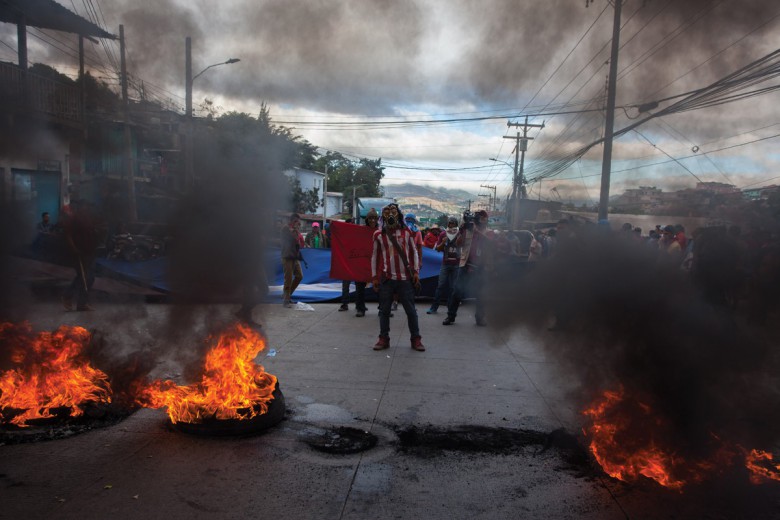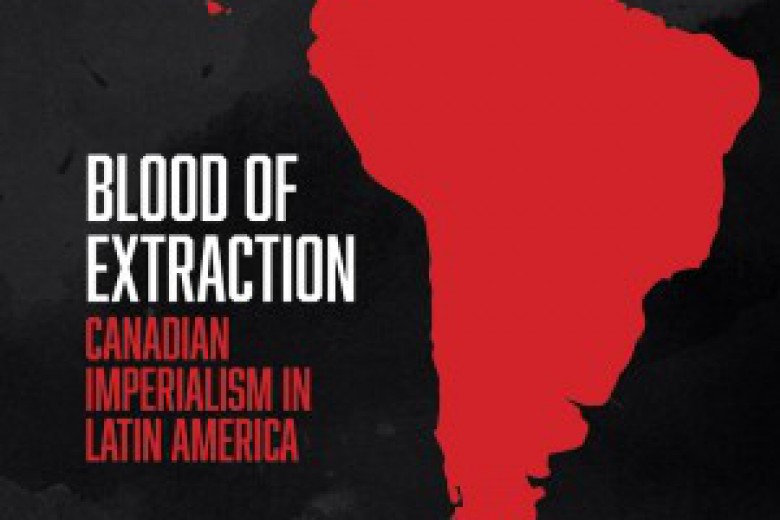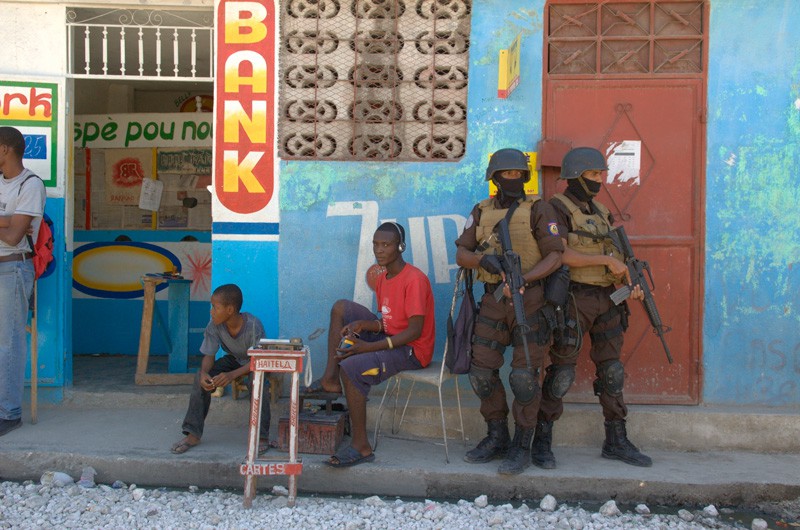
During the buildup to and aftermath of the 2004 overthrow of Jean-Bertrand Aristide, Haiti’s popular priest-turned-president, two conflicting and contradictory narratives were being reported by the Haitian and international press. Even in the left-wing media office of ZNet, where Justin Podur was an editor, the stories filed from Haiti didn’t add up.
“One is a story about a leader becoming a dictator and getting overthrown leaving a basket-case country in a basket-case condition. The second is the story of a popular movement being thwarted in its struggle for democracy and development and ending with a new dictatorship imposed upon it,” writes Justin Podur, associate professor in environmental studies at York University, in his recently released book Haiti’s New Dictatorship: The Coup, the Earthquake and the UN Occupation (Between the Lines, 2012). In it, Podur documents the total subordination and outsourcing of a nation’s sovereignty to a decentralized, multilateral, unaccountable network of foreign governments, international financial institutions, aid organizations, transnational investors, and the United Nations – all working in concert with local elites to rob Haiti of its hard-won democracy.
When did you decide you wanted to write Haiti’s New Dictatorship?
I was a volunteer editor at ZNet at the time, as I still am now. I found that what seemed like a clear-cut case of a coup was generating a surprisingly divided response from progressive organizations, including those with operations on the ground in Haiti. I realized that in order to be a responsible editor I would have to study Haiti closely and understand the different claims and the evidence to support them. That led to wanting to go there and talk to people first-hand. I ended up keeping a long, running document of sources and evidence, a kind of ongoing chronology, that became the skeleton for the book.
In many ways, Haiti is an avant-garde microcosm of the privatization, deregulation, and loosening of state structures and protections that is happening everywhere. But in Haiti, the language of human rights, sustainable development, and humanitarian aid is co-opted to allow an ever-greater penetration and subordination of Haiti’s economy to transnational capital. The new dictatorship in Haiti uses the language of human rights and frames almost everything it does in terms of charitable intervention, and then uses the media to astroturf that message. As you say in the book, who needs to muzzle the press if you can just outcompete them in PR and propaganda? How do you think we can learn to discern these sorts of events in real time?
While the rhetoric coming from different sectors has been very divided, the evidence has been solid throughout, especially on a quantitative basis. Part of the reason for the book is to document how the post-coup government was quantitatively worse than Aristide’s government. And an important part of being able to understand current events is understanding the history.
Human rights are quantifiable, but often only after the fact, which makes the pre-emptive war doctrine so problematic. You call “responsibility to protect” the evolution of “white man’s burden,” which I thought was a good way of putting it.
It could be that human rights is not a robust enough concept to constrain powers from committing violations. One concept I don’t think the pro-coup forces in Haiti can co-opt is the concept of sovereignty. This can inform how Haiti can be helped today. An example: the immediate rescue operations after the earthquake in 2010 were hindered by an excessive emphasis on security for the foreigners who came to help – the U.S. Marines who focused on the protection of their forces, the NGOs who insisted on travelling with armed security. This wouldn’t have happened if Haitians had been in charge of the rescue operations themselves. Haitians aren’t fed the same diet of racist stereotypes about Haitians, or about people of African descent, that Westerners are fed. These stereotypes have deadly consequences in high-stakes situations like the earthquake.
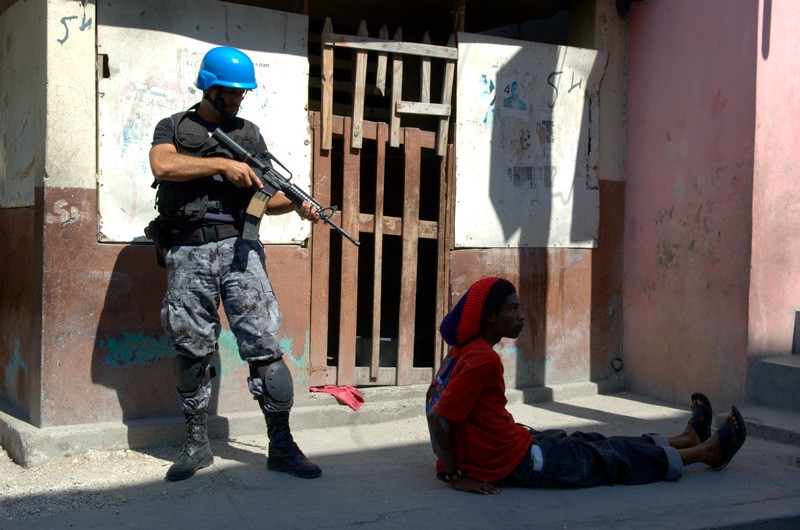
Does the concept of the new dictatorship apply elsewhere? Haiti’s not an isolated case. Can you unpack it for us?
I think that somewhere out there there is a playbook for how to overthrow governments with multilateral coalitions and propaganda, but there are local differences. Huge numbers of people in Libya hated Gaddafi. Huge numbers of people in Syria hate Assad. This wasn’t the case for Aristide. Small numbers of people in Haiti hated Aristide, and still do. But Aristide had no army, and the evidence of Aristide’s human rights violations was not there. There is just no comparison between Aristide and these actual dictators.
But even in these cases – in Libya, or Iraq, or Afghanistan – it is hard to say that the situation is better after regime change. The regime change in Iraq came at the cost of a million Iraqi lives. The regime change in Afghanistan has led to 11 years of occupation, drones, and a resurgent Taliban. We don’t even know what the results of the Libya regime change are going to be, but there is a lot of reason to be pessimistic.
The thing that seems unique about this new dictatorship, as opposed to traditional dictators like the ones recently toppled in the Middle East or Papa and Baby Doc Duvalier in Haiti, is you can pin the tens of thousands of deaths at the hands of their Macoutes [Duvalier-era paramilitary death squads] to a pretty clear chain of command. This new dictatorship is less centralized; it’s totally diffuse and totally unaccountable. There’s no way the International Criminal Court could indict anyone in MINUSTAH (the United Nations peacekeeping force brought in to replace U.S., Canadian, and French troops after the coup) for the summary executions, disappearances, or election manipulations all taking place on its watch. Even with all the evidence proving UN troops brought the cholera epidemic that has now killed thousands, no one has been held accountable, or even apologized.
Cholera is a perfect example. When public health researchers like Rene Hendriksen closed the book on the case through a genome study, they were careful in stating that even though the evidence was clear that it was MINUSTAH that brought cholera to Haiti, no one in particular was to blame because the 7,500 deaths were inadvertent. This isn’t false. But the fact that it is almost an inevitable consequence of the way Haiti is governed makes it more damning, not less, of this whole system that I’m calling Haiti’s New Dictatorship.
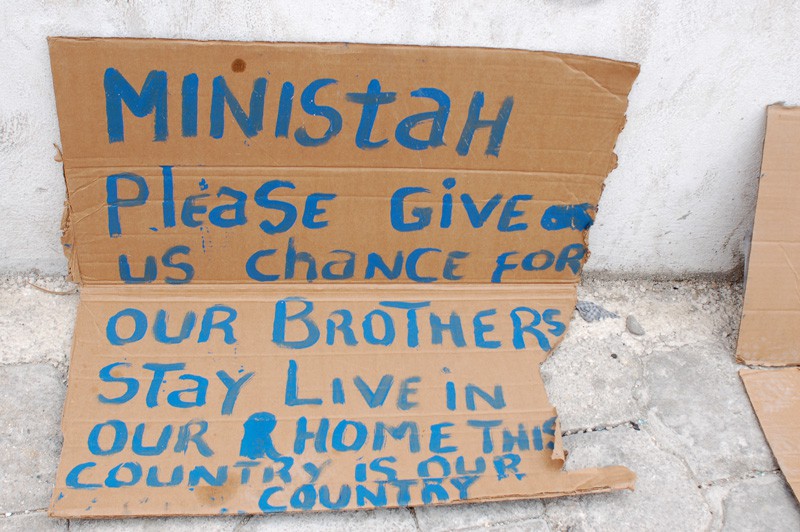
How did the U.S. convince burgeoning democracies in Latin America to send their troops to Haiti?
Every country in Haiti is there for its own reasons. None of them is there for Haiti. Take Canada, for example. Canada’s involvement in Haiti is a good example of Canadian peacekeeping. In 2004 there was a fallout between Canada, France, and the U.S over their non-involvement in the 2003 Iraq War. Canadian peacekeeping, since its inception in the 1950s, has not been about keeping peace in the world but about keeping peace between the great powers. During the Suez crisis, it was about keeping peace between the U.S. and the U.K. In 2004 it was about keeping the peace with an unhappy U.S. after their Iraq invasion. The same goes for other countries. Brazil wants to be a player on the world stage, and Haiti’s an easy place to flex your muscles and practice counterinsurgency.
What do you think will be the most controversial aspect of your book?
I think the hardest thing to accept, for me, was that this is all being done by the United Nations. It’s hard for people to digest that the UN could have done all this. When the U.S. supported the overthrow of Aristide in the 1990s, that was in line with what the U.S. has always done in Latin America, or what France has always done in Africa, so their participation in 2004 was less surprising. But the idea that the UN was running through neighbourhoods in Port-au-Prince shooting up peoples’ corrugated metal houses is harder to take.


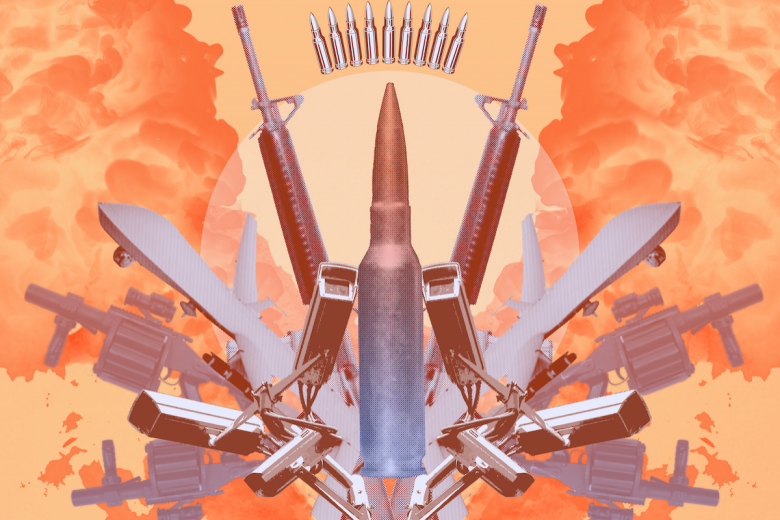
_780_520_90_s_c1_c_c.jpg)
